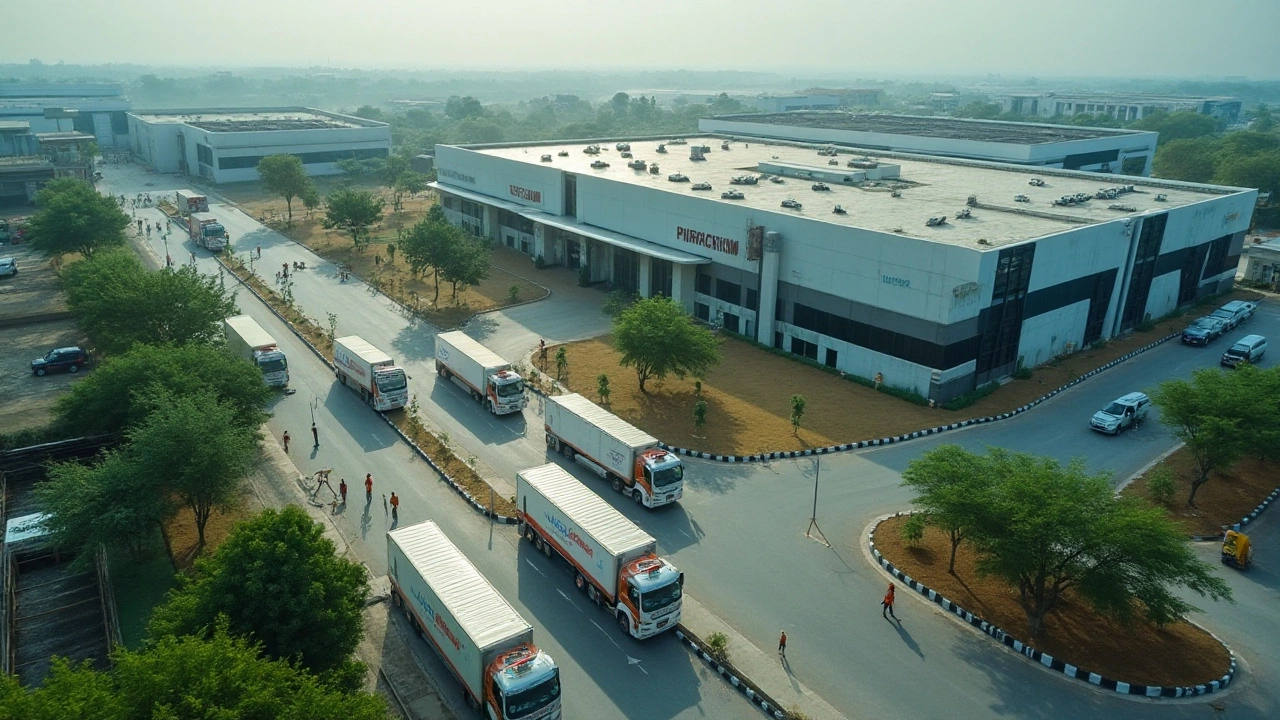India's pharmaceutical sector has become a cornerstone of the global healthcare landscape. Known for its ability to produce high-quality generics at affordable prices, the Indian pharma industry is a crucial player on the world stage. Several Indian pharmaceutical companies have achieved significant wealth, playing a pivotal role in both domestic and international markets. These companies have paved the way for innovative treatments and have made substantial impacts on global health.
Understanding the success of these pharmaceutical giants is key to comprehending the dynamics of the Indian economy. The interplay of research, cost-effective production, and strategic market expansions are vital components of their success stories. This narrative provides a closer look at who these major players are, what drives their success, and how they contribute to shaping the future of healthcare both in India and beyond.
- Introduction to India's Pharma Industry
- Key Players in the Market
- Financial Growth and Global Reach
- Innovation and Product Development
- Challenges and Opportunities
- Future Outlook of Indian Pharma Companies
Introduction to India's Pharma Industry
India's pharmaceutical industry stands as one of the largest sectors in the country’s economy, playing a crucial role in global healthcare. The industry is renowned for its ability to produce a wide range of medicines at competitive prices. This capability not only drives domestic sales but also supports global demand for affordable drugs. India pharmaceutical giants have managed to penetrate markets worldwide, making India the largest provider of generic medicines globally, supplying nearly 20% of the world’s generic drugs.
The history of India's pharmaceutical sector dates back to the early 20th century, but it wasn't until the 1970s, after the introduction of the Indian Patent Act, that the industry saw a significant boom. This act allowed local companies to replicate patented foreign drugs, significantly enhancing access to medicines for the Indian population. Over the years, this move has fostered a thriving ecosystem of leading pharma companies, equipped with much-needed expertise in research and development.
Today, the contribution of Indian pharma companies to healthcare goes beyond producing generics. They are actively involved in new drug formulations and innovative treatments, which have garnered recognition worldwide. Among the richest Indian pharma entities, companies like Sun Pharmaceuticals, Cipla, and Dr. Reddy’s Laboratories have consistently topped the charts, reflecting both financial growth and a commitment to global health. This was succinctly observed by a leading industry expert who noted,
'The Indian pharmaceutical industry is the bedrock of resilient healthcare solutions, standing as a testament to what cutting-edge innovation coupled with affordability can achieve.'
The production of vaccines and biopharmaceuticals is another area where India's pharma industry is vastly prominent. India's prowess in this arena was visibly highlighted during the COVID-19 pandemic, with Indian companies emerging as significant suppliers of vaccines to several countries. These efforts have further cemented India's reputation as a reliable and indispensable player in the global pharmaceutical industry. The government's ongoing support through policy initiatives, coupled with the industry's inherent strengths, continues to propel the sector forward with tremendous potential for future growth.
Here's a brief snapshot illustrating the monumental scale of India's pharma industry:
| Aspect | Details |
|---|---|
| Market Size | USD 50 billion (2023) |
| Global Market Share | 20% in generics |
| Exports | USD 24 billion (2023) |
| Leading Companies | Sun Pharma, Cipla, Dr. Reddy's |
The industry is not without its challenges, however, facing issues such as regulatory hurdles and supply chain complexities. Nonetheless, the dynamism and adaptability that characterize the Indian pharma sector ensure it remains a formidable force, meeting challenges head-on and continuing to deliver essential health solutions worldwide. As the industry advances, its commitment to innovation and accessibility remains unwavering, underscoring the bright future that lies ahead for Indian pharmaceuticals.
Key Players in the Market
In India's vibrant pharmaceutical sector, several companies have cemented their status as industry leaders, showcasing the remarkable prowess and potential of this industry. Among these giants, Sun Pharmaceutical Industries stands as a titan. Founded in 1983 by Dilip Shanghvi, this company has consistently surged forward with its focus on various therapeutic categories such as psychiatry, neurology, and cardiology. Sun Pharma is renowned for its strategic acquisitions, like that of Ranbaxy in 2015, which propelled it to the position of the largest pharmaceutical company in India and a major global player.
Cipla Limited, another key player, has been a cornerstone of the Indian pharma industry since its inception in 1935. Known for its pioneering strides in producing affordable medication, Cipla played a crucial role during the HIV/AIDS epidemic by supplying antiretroviral drugs at a fraction of the cost. This bold move not only saved millions of lives but also redefined how the world viewed Indian pharmaceuticals and their compassionate capitalism.
Dr. Reddy's Laboratories, established in 1984 by Dr. K Anji Reddy, has been instrumental in enhancing India's pharmaceutical export portfolio. The company focuses on generics, over-the-counter products, and major biosimilars, steadily expanding its reach into international markets, especially in the U.S. and Europe. Dr. Reddy's remains committed to its mission: providing affordable and innovative medicines for healthier lives.
Naturally, the trajectory of these companies highlights the persistent quest for innovation. Biocon, led by the indomitable Kiran Mazumdar-Shaw, pioneered the biotechnology spotlight in India. Its emphasis on biopharmaceuticals, particularly in producing biosimilars, has positioned Biocon as a significant innovator. The company’s focus on affordable insulin has made it an essential player in addressing global diabetes management challenges.
Another sterling name that shines brightly is Lupin Limited, established in 1968 and spreading its wings globally with formidable markets in America and Japan. Lupin's vision is tied to creating a healthier world by providing high-quality medicines that are affordable to a broad spectrum of society. Its dedication to research and development has allowed it to stay at the forefront, particularly in areas like respiratory and women's health.
Reflecting on these successes, it becomes clear that the strength of these companies lies not just in their economic triumphs, but their commitment to health equality and accessibility. As Anil Kapoor, a senior analyst states,
"The Indian pharmaceutical industry's prowess is a testament to its dedication to innovation, affordability, and global healthcare improvement."The synergy between ethical practices and robust business strategies marks the identity of India's richest pharmaceutical firms, a model other growing economies may learn from.

Financial Growth and Global Reach
In recent years, India's pharmaceutical giants have surged ahead, transforming the country into a dominant force in the global health market. At the forefront of this shift are corporations that have adeptly leveraged their resources to achieve substantial financial growth. Take Sun Pharmaceutical Industries, for example - a leader in the industry. Their aggressive mergers and acquisitions strategy, coupled with a robust portfolio, has fueled continuous expansion across international markets. Similarly, Dr. Reddy's Laboratories has excelled by capitalizing on strategic partnerships and expanding its product offerings to cater to the varied demands of global markets, thus increasing their revenue streams manifold.
The success story of these companies lies in their ability to simplify the complex processes of drug production while maintaining quality standards that comply with, and often exceed, Western regulations. For instance, Cipla has been instrumental in reducing the cost of antiretroviral drugs globally, actively contributing to the affordability of HIV treatment. Their financial prowess is evidenced by their global presence, with exports accounting for a significant chunk of their revenues.
"India now produces 20% of the world's generic drugs making it an essential player in providing affordable medications," stated a report by the Federation of Indian Chambers of Commerce & Industry (FICCI).
Another pillar of India's pharmaceutical growth strategy is its ability to penetrate emerging markets effectively. Companies like Aurobindo Pharma have invested significantly in these markets and have benefitted from diversifying their income sources. The move towards biologics and biosimilars has opened new revenue streams, setting them apart in a competitive global landscape. Moreover, industries focusing on Research & Development (R&D) are seeing unprecedented returns. According to a 2023 industry report, Indian pharma companies spend about 8-11% of their annual revenues on R&D, a marked increase from previous years. This commitment ensures that innovation is at the heart of their operations, positioning them well for future opportunities.
The financial statements of these leading players often highlight their strategic investments in technology and infrastructure, both critical to sustaining long-term growth. For example, Piramal Enterprises' investment in digitization and process automation has optimized their productivity, showcasing their readiness to adapt to contemporary challenges in pharma logistics. This commitment is further supported by India's governmental policies, which encourage foreign investments and partnerships, enhancing the global reach of Indian pharma companies.
In understanding the trajectory of Indian pharmaceutical companies, it becomes clear that their financial success isn't merely a result of past accomplishments but a testament to their ongoing adaptability and innovation. As they continue to expand their footprint globally, their role in reshaping the dynamics of the pharmaceutical trade is both evident and invaluable. The lessons drawn from their strategies and growth patterns offer a blueprint for emerging markets aiming to stake their claim in the global pharmaceutical industry.
Innovation and Product Development
Innovation in the Indian pharmaceutical industry has been a key driver of its rapid growth and global reputation. Companies in India have consistently focused on enhancing their research and development capabilities to unveil groundbreaking drugs that meet the world’s pressing health challenges. This journey is characterized by substantial investment in cutting-edge technologies, state-of-the-art facilities, and hiring of highly skilled scientists. The emphasis is not only on creating new drugs but also on improving existing medications to increase their efficacy and reduce side effects.
Take, for instance, Dr. Reddy’s Laboratories, which has made significant strides by opening specialized facilities for biological research. Their focus extends to pioneering treatments in oncology and other critical therapeutic areas. By leveraging biosimilars, they've enabled more accessible treatment options for complex diseases, bringing hope to millions worldwide.
Another exemplary giant, Sun Pharmaceutical Industries, is renowned for its specialization in generic medication. Their strategy integrates advanced technological platforms and collaborations with international research entities to innovate rapidly. A noteworthy segment of their innovation approach includes an intense focus on patient-centric solutions, which ensures they remain in tune with global health demands. The firm's commitment to quality and innovation positions it as an influential leader in the generic drug sector.
"Our primary objective is to make medicines accessible and affordable to the global population by nurturing cutting-edge research," said Dilip Shanghvi, founder of Sun Pharmaceutical Industries.
The journey of innovation is not devoid of challenges. Indian pharmaceutical manufacturers face fierce competition, both locally and globally, along with the pressures of meeting international quality compliance standards. However, these challenges have not deterred their determination to excel. Instead, they've fostered a culture of continuous improvement and ingenuity. The success stories of these leading pharmaceutical companies in India present insightful perspectives on driving innovation despite the odds.
Emerging as both affordable and reliable in the healthcare industry has, largely, been a matter of survival and adaptability. This environment has encouraged Indian companies to pursue licensing partnerships, joint research ventures, and technology transfers to achieve cost-effective production. As they continue to expand their global footprint, these partnerships play an instrumental role in navigating regulatory landscapes and penetrating new markets.
Observing India's pharmaceutical scene, one cannot overlook how digital transformation acts as a catalyst for innovation. With the advent of AI and machine learning, Indian pharma is delving into drug discovery with increased precision. This shift not only accelerates development timelines but also enhances success rates. Real-time data analytics and personalized medicine are the new frontiers that these companies are exploring, promising a bright future for the pharma industry in India.
In the realm of product development, leading firms have adopted aggressive strategies to differentiate themselves. Glenmark Pharmaceuticals, for example, is heavily invested in novel drug delivery systems, ensuring superior efficacy and patient compliance. Through these endeavors, they aim to deliver high quality and affordable medications on a global scale, reinforcing India's status as the "pharmacy of the world."

Challenges and Opportunities
The Indian pharmaceutical industry stands at a crossroad of immense potential and significant obstacles, a reflection of its complex operating environment. On one hand, the regulatory framework that governs drug approval processes can be both an opportunity and a challenge. Stringent regulations ensure the production of high-quality medicines, boosting the reputation of Indian pharmaceutical giants like Sun Pharma and Dr. Reddy's in global markets. However, navigating these requirements can be daunting for smaller firms lacking resources, potentially stifling innovation. Ensuring compliance while maintaining cost-effectiveness is a delicate balance that these companies must manage carefully.
One of the significant challenges is the increasing competition from local and international pharmaceutical companies. With countries such as China ramping up their manufacturing capabilities at a breakneck pace, Indian companies must innovate to stay ahead. This competition forces Indian firms to diversify their product pipelines and enter into new therapeutic areas to sustain growth. Interestingly, while this competition is fierce, it also drives innovation, encouraging Indian firms to explore new markets and adapt cutting-edge technologies such as biotechnology and personalized medicine.
According to KPMG, "Indian pharmaceuticals will need to explore innovative business models and extensive collaborations to maintain their momentum in the international markets."
An area ripe with opportunity is the biologics segment. Indian pharmaceutical companies are gradually expanding their focus beyond traditional generics to include biosimilars, which offer significant revenue potential. With several high-revenue biologic drugs facing patent expiration soon, Indian manufacturers are positioned to capitalize on the biosimilars market's exponential growth, thereby learning from past experiences in generic drugs. This shift not only enhances their product offerings but also solidifies their standing as leading pharma companies globally.
Additionally, the digital transformation is another opportunity that Indian pharma can strategically leverage. By adopting digital health platforms and artificial intelligence, companies can enhance drug discovery processes and improve supply chain efficiency. These technologies offer the chance to achieve operational excellence and provide healthcare solutions tailored to individual needs, increasing market competitiveness. Yet, this requires significant initial investment and a skilled workforce, factors which may affirm the divide between the large players and smaller, less equipped firms.
The Indian government's initiatives to bolster pharmaceutical development through policy support and infrastructure improvements also present substantial opportunities. Programs like 'Make in India' aim to enhance domestic production capabilities and reduce reliance on imports. These measures are pivotal in encouraging growth as they enhance the industry's capability to meet increasing global demand for high-quality generics and bulk drugs. However, to seize these opportunities, companies must establish strong collaborations with research institutions and continuously develop a skilled talent pool.
Moreover, developing new markets, particularly in Africa and Southeast Asia, where demand for affordable medicines is rising, can drive the next wave of growth for Indian pharmaceutical companies. As these regions experience economic growth and improve healthcare access, Indian pharmaceuticals have a chance to establish a significant presence by offering affordable and effective medicines. Nevertheless, entering these new markets involves overcoming regulatory differences and cultural barriers, which can be complex but ultimately rewarding when managed well.
Future Outlook of Indian Pharma Companies
As we stand at the threshold of a new era in healthcare, the future of Indian pharmaceutical companies promises to be both dynamic and challenging. These companies have established themselves as pivotal players in the global market, and their strategic expansions continue to bolster their standing. With a focus on innovation, research, and development, Indian pharma firms are set to harness the power of emerging technologies like biotechnology and personalized medicine. Such advancements offer the potential to create more effective and targeted therapies, which could radically transform patient care and treatment outcomes.
The continued emphasis on producing high-quality generics is expected to be a significant growth driver. The cost-effective production model that Indian companies have mastered will remain crucial in maintaining their competitive edge globally. Many of these firms are now exploring new markets in Africa and Latin America, capitalizing on the rising demand for affordable healthcare solutions in these regions. However, with opportunity comes challenge. The evolving regulatory landscapes across various countries, particularly in Europe and the United States, mean that companies must stay agile and adaptive.
"The Indian pharmaceutical industry has a tremendous potential to shape global health trends with its innovation and cost leadership," said Dr. Reddy, a noted analyst in the pharmaceutical sector.
The importance of building on biologics and biosimilars also cannot be understated. With patents on several blockbuster drugs expiring soon, Indian companies are poised to enter the biologics market. This shift requires considerable investment in research and a skilled workforce but offers substantial rewards by providing new treatment options for complex diseases. As Indian pharma giants shift from being generic producers to innovators, their role in advancing global healthcare is set to deepen.
Digital transformation is another frontier that will influence the future of the Indian pharmaceutical industry. The integration of digital technologies such as artificial intelligence, machine learning, and blockchain into drug development and supply chain management promises greater efficiency and transparency. These technologies not only streamline operations but also ensure more robust tracking of drug quality and authenticity. This is crucial in battling counterfeit medications, particularly in the extensive domestic market.
Moreover, strategic collaborations and partnerships with international companies are expected to rise. Such alliances offer opportunities for knowledge sharing and access to advanced technologies. For example, Indian companies are increasingly engaging in collaborative research with leading global institutions to expedite new drug discovery processes. They are also likely to engage more deeply with healthcare providers, enhancing the integration of pharma products within healthcare systems through real-world data applications.
As the Indian pharmaceutical landscape evolves, the need for skilled talent will grow, leading to investments in workforce development. Educational initiatives aimed at equipping the next generation of scientists and technicians with the necessary skills to thrive in a tech-driven industry are likely to become more prevalent. This nurturing of talent will not only support the domestic market but also strengthen India's role as a major supplier of skilled personnel to the global pharmaceutical arena. Ultimately, the path that Indian pharma companies take will depend on their ability to innovate and adapt to global changes while continuing to provide affordable, accessible healthcare solutions.







